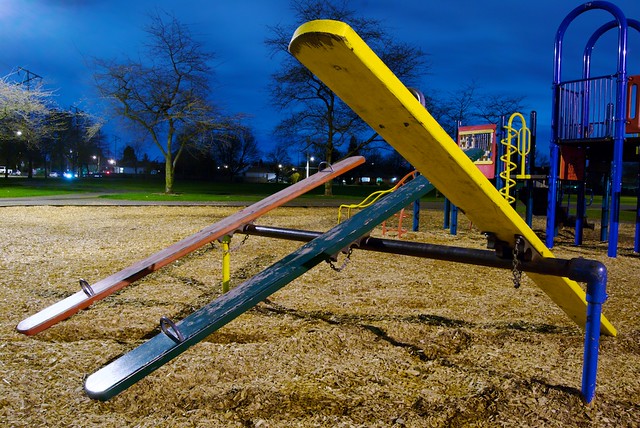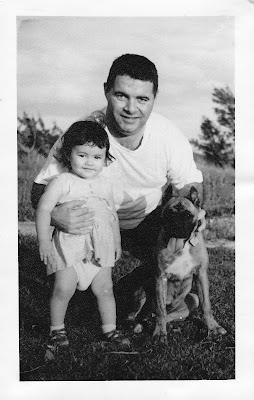 |
| © 2008 Peat Bakke, Flickr | CC-BY | via Wylio |
But I loved even more the challenge of keeping the seesaw suspended in mid-air with a playmate who weighed the same as I did. For some reason the gravitational stalemate gave me a sense of satisfaction.
Perhaps my fascination with playground physics was useful in helping me accept theological tensions such as the sovereignty of God and the free will of humans. I try to hold two seemingly contradictory views together in balance.
But it doesn't work for me as an evangelical woman with a passion for ministry in a church community.
There was a time I tried to keep both a hierarchical view of authority in the church and a freedom for women to use their Spirit-given gifts as they felt called by God.
I had started the journey of wrestling through the issues of a woman's place in the life of the church. But then I got caught in the middle where I was undecided how far I would go along the spectrum of beliefs about women.
I was certainly moving away from complementarian theology (women can only be teachers and leaders of other women; husbands lead, wives submit) which took shape during Bible college and was reinforced in my church. Years later I progressed to believing women could teach men and preach behind the pulpit.
But it was hard to cut the cord to nearly 30 years of believing the absolutist doctrine of ordained male leadership. Surely women could be truly valued and free under the authority of male elders. Godly male elders. Really really kind gentle male elders. And if they had a family, elders who loved their wives and daughters and therefore understood other women enough to pay attention to their voices in the community. (Hmmm...I could never figure out why single male elders were allowed despite the plain reading of 1 Timothy 3:2.)
I was trying to find a middle ground, that sweet spot on the seesaw that kept my complementarian theology balanced with my egalitarian heart. I even found a church that was trying to do the same thing with their "soft" complementarian position.* They really believed that it was possible for complementarians and egalitarians to worship and serve together in one community. I really wanted it to be possible too.
But after six years of disappointments, I quit straddling the fulcrum between egalitarianism and complementarianism. I lifted my foot off the one side and planted both feet fully on the side of full freedom for women and what I believed to be the real vision of the Kingdom. I couldn't run fast enough down the plank to search for a fully egalitarian church, one with women elders, which I found.
I love seesaws, but on the issue of women, the metaphor doesn't work. I cannot be an egalitarian and worship in a complementarian church anymore. And as moderate as a "soft" complementarian church may be, it is still a hierarchy with power vested in men alone.
Eventually my seesaw had to tip to one side or the other. I made the choice of which side with full integrity as I searched through Scripture and with discernment in how the Spirit had been moving in my life all along.
The middle spot is unsustainable on this issue. Gravity will win and one side will crash.
It will crash because theology and Bible interpretation has been and will continue to be a place of disagreement. In other words humans will always pick and choose what they want to believe and practice. Churches that try the middle spot will find that it is a place where theology is suspended or ignored or compromised. But it doesn't work for the long term because theology cannot be kept private when the practices of the church are public. A church cannot avoid practicing their doctrine of women. So complementarians walk out of services when a woman preaches and egalitarians grieve where women are absent or silenced.
It will crash because we are sinful. In other words humans are limited and fallible and will always struggle with loving well. So there is no such thing as truly benevolent male elders. Sin has distorted perceptions of women as well as perceptions of men. The only way to overcome sin's impact on gender relations is to distribute the power equally and create a leadership space where every voice has authority and choice to submit to one another. Without women in the room, hidden misogyny or damaging attitudes may not be exposed. As long as men hold absolute authority there is always the possibility for blind spots and an inability to hear women accurately. And maybe even the possibility of abuse. How can a church address justice issues in the world if it's not willing to address justice issues in its own house?
It will crash because we can't rid ourselves of our cultural influences and agree upon one lens through which we view and interpret the world or Scripture. In other words humans will always have their biases. But many biases have changed through the course of history. Much of God's will in heaven and the movement of the Spirit on earth is a mystery but if we pay attention to what He has been doing through time, we can glimpse the path we should take culturally. If God created male and female to rule together at the beginning and if there is no gendered hierarchy in the new heavens and new earth, then the middle time of the church should be an increasing transformation into what God intended and will bring about in the end.
The transformation may be slow, but it's unstoppable. And it's better understood in hindsight.
Luther's Reformation tells us that the church got it wrong at one point. When it comes to women, they have it wrong again. But I believe there's another reformation in the air. It may be hard to find evangelical, egalitarian churches now but I sense a tipping point ahead.
The seesaw has a slight tilt to one side.
*The "soft complementarian" position is articulated by Craig Blomberg in his essay found in the revised edition of Two Views on Women in Ministry. The doctrine and its practice is established by loosening up on some biblical passages while holding fast to others. Women are free to use their Spirit-based gifts in teaching and preaching but they are excluded from positions that hold the highest level of authority in the church whether it's an elder board or a senior pastor position.
